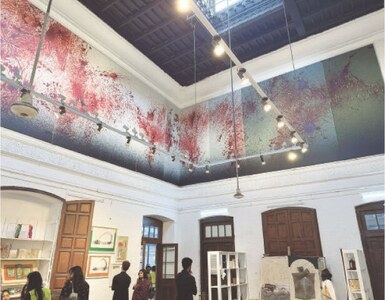
My grandfather’s long and celebrated association with Radio Kashmir is part of the tapestry of our family memory. Mir Ghulam Rasool Nazki was an acclaimed poet and writer, who started his career as a teacher at the tender age of 16. It is said he found his literal and metaphorical voice through radio.
Woven into it is his journalistic career, documented by a couple of treasured photos in the family archives, and his live commentary during President Rajendra Prasad’s boat procession in Srinagar in 1950. This was a high-profile event: India’s first president accompanied by Kashmiri prime minister Sheikh Mohammad Abdullah, in a procession of boats along Srinagar’s beautiful river Jhelum. This was also the first time Radio Kashmir had done a live broadcast from outside its studios.
Equipped with his microphone, my grandfather was reporting the event from amidst the participants who were also part of the audience he was reporting for. As I look at that picture, I imagine people huddled around radio sets at home, listening to his commentary as though they were a part of what was happening there. With his microphone, he was bringing a historical moment to life for them.
A BBC television broadcaster compares her grandfather’s prolific radio career 70 years ago with her own technology-driven work today
Fast-forward 70 odd years. Here I am, his granddaughter, producing and presenting live from London the BBC’s flagship TV programme Sairbeen, which itself evolved from the iconic (and still popular) radio programme of the same name. And it is my job to bring the BBC’s stories to life for our TV audience.
Every day, as I enter the state-of-the-art TV studio to which, as part of the Sairbeen “refresh”, we have now moved our live broadcasts, I remember the start of the pilots when I felt the giant touchscreen staring at me, as if it was waiting for me to test it out. As I was getting to grips with all the swiping, opening and closing boxes on the touchscreen, I sometimes found myself thinking back to the days of that treasured picture from our family album: Mir Ghulam Rasool Nazki, with a microphone in his hand, doing what I am doing now: telling stories.
In just a few years, our media landscape has been revolutionised by the access to information provided by social media. But as I present live in front of the touchscreen, I know that our basic journalistic mantra remains unchanged: content — and trustworthy content — is the key. The touchscreen empowers me to bring stories in a way that was hardly feasible a few years ago. It allows me to deliver to our TV audience a “picture-challenged story.” Then, of course, there are stories that just lend themselves better to the touchscreen, especially those sourced from, or revolving around, “social” (at BBC Urdu we call it Social-estan). While on air in that studio, our audiences follow stories from various sources and engage with them on multiple platforms, so we need to not only keep up but also be ahead of the game with stories that they can trust.

I hope that the journalists’ drive to make content as engaging and relatable as possible, for as wide an audience as possible, will mean more young, and female, audiences will come to them for independent and trusted news. I see the role of a presenter as that of a guide — someone who leads you through exclusively curated content. In front of that touchscreen, this role of mine becomes even more hands-on as I invite the viewer to swipe, touch, open and close boxes with me, talking them through various elements of the story while acting as an anchor holding all the content in place.
In just a few years, our media landscape has been revolutionised by the access to information provided by social media. But as I present live in front of the touchscreen, I know that our basic journalistic mantra remains unchanged: content — and trustworthy content — is the key.
On July 1, 1948, my grandfather made the station’s very first radio announcement on Radio Kashmir in Srinagar. I started presenting Sairbeen on TV in 2013. The butterflies in my stomach just before going live haven’t disappeared — and I don’t think they ever will. As any TV presenter, I am all too aware of the stress and the “high” of live broadcasts. As things go smoothly — or with a glitch — I know that everything is fluid and almost everything is fixable, as long as you are honest with your audience.
I still find myself wondering every now and then, in the middle of a touchscreen sequence, what Nazki Sahib, holding a microphone in hand, would have made of all this.
Aliya Nazki is the main presenter of the BBC News Urdu TV programme, Sairbeen, which is broadcast live from London by AAJ News, and is streamed on bbc.com/urdu
Published in Dawn, EOS, May 12th, 2019


































